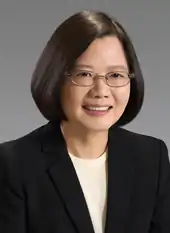2020 Taiwanese presidential election
The 15th presidential and vice-presidential election of the Republic of China (Chinese: 中華民國第十五屆總統副總統選舉) was held in Taiwan on 11 January 2020 along with the 10th Legislative Yuan election. Incumbent president Tsai Ing-wen and former premier William Lai of the Democratic Progressive Party (DPP) won the election, defeating Kaohsiung mayor Han Kuo-yu of the Kuomintang (KMT) and his running mate Chang San-cheng, as well as third-party candidate James Soong.[1][2]
| ||||||||||||||||||||
| Registered | 19,311,105 | |||||||||||||||||||
|---|---|---|---|---|---|---|---|---|---|---|---|---|---|---|---|---|---|---|---|---|
| Turnout | 74.90% | |||||||||||||||||||
| ||||||||||||||||||||
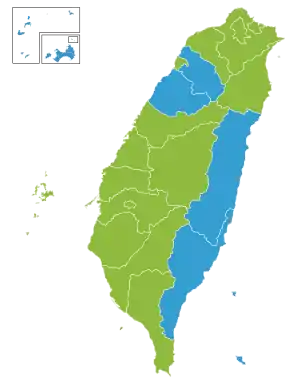 Vote leader in county-level units. Green: Tsai-Lai ticket; blue: Han-Chang ticket | ||||||||||||||||||||
| ||||||||||||||||||||
Following major losses during the 2018 Taiwanese local elections, Tsai Ing-wen resigned from her party's chairmanship and was challenged in the primary contest by former Premier William Lai, himself a former Tsai appointee. The Kuomintang also ran a competitive primary, which saw Han Kuo-yu, initially reluctant to run, defeat former presidential candidate and New Taipei mayor Eric Chu, and Foxconn chief executive Terry Gou.
Both domestic issues and Cross-Strait relations featured in the campaign, with Han attacking Tsai for her perceived failures in labour reform, economic management, and dealing with corruption of her aides. However, Tsai's strong response to Beijing's increasing pressures on Taiwan to accede to a unification agreement, amid the backdrop of the intensely followed Hong Kong anti-extradition protests, proved crucial in her recapturing broad support.
The election had a turnout of 74.9%, the highest among nationwide elections since 2008. Tsai won a record 8.17 million votes, representing 57.1% of the popular vote, the highest vote share won by a DPP candidate in presidential elections.[3] The DPP received a higher share of the vote in major metropolitan areas, reversing the KMT's fortunes in Kaohsiung and environs, while the Kuomintang retained strength in limited eastern regions and off-island constituencies. Tsai and Lai were inaugurated on 20 May 2020.
Eligibility
Presidential candidates and Vice Presidential running mates are elected on the same ticket, using first-past-the-post voting. This was the seventh direct election of the president and vice president, the posts having previously been indirectly elected by the National Assembly until 1996.
Under applicable legislation, any party which received more than five per cent of the total vote share in the latest election in any level were eligible to contest the election. The Democratic Progressive Party (DPP), Kuomintang (KMT), New Power Party (NPP) and People First Party (PFP) were eligible, though in the end only three major-party candidates were certified: incumbent President Tsai Ing-wen of the Democratic Progressive Party, Kaohsiung mayor Han Kuo-yu of Kuomintang, and perennial veteran candidate James Soong of the People First Party. Vice President Chen Chien-jen, Tsai's running mate in 2016, was eligible for re-election but chose not to contest.[4]
Background
Tsai Ing-wen suffered a stinging defeat during the 2018 Taiwanese local elections due to widespread discontentment over numerous domestic policy issues, including public pension reform, same-sex marriage, pollution, and labour reform. In the lead up to the election, her staffers were found to have been implicated in a tobacco smuggling ring, which also allegedly involved the top management of flag carrier China Airlines and National Security Bureau. Dogged by scandal and having lost on major referenda questions, Tsai's clout continued to deteriorate both in her own party and more broadly.[5]
The major inflection of the campaign came amid the Hong Kong anti-extradition bill protests, an event that was triggered with the murder of Poon Hiu-wing in Taiwan. As the protests became heated over the later half of 2019, Tsai began to portray the situation in Hong Kong as a direct result of an encroachment of the territory's autonomy from Beijing. In January 2019, Xi Jinping, General Secretary of the Communist Party of China, had announced an open letter to Taiwan proposing a one country, two systems formula for eventual unification. Additionally, over the course of 2019, several small nations that previously had diplomatic ties to Taiwan, including Panama, Kiribati, and Solomon Islands, broke off relations in favour of the PRC. Tsai issued pronouncements that Taiwan will "never accept one country, two systems" and that "today's Hong Kong could be tomorrow's Taiwan". Tsai's strong positioning ultimately led her to victory in what was a bruising primary challenge by Premier William Lai.[6]
Tsai reconciled with diverse elements in her party in signing up Lai to be her running mate. Kuomintang, after fits and starts over procedural disputes, flirted with a high-profile nomination of Foxconn chief Terry Gou. The party ultimately nominated firebrand Han Kuo-yu, who had in 2018 successfully run an insurgent mayoral campaign in the DPP stronghold of Kaohsiung. However, his combative, eccentric antics and participation in the presidential election soon after his taking on the post in Kaohsiung earned him scorn from detractors.[7][8] Additionally, Tsai made hay with Han's perceived friendliness with Beijing, citing his early 2019 visit to mainland China where he met with multiple high-level Communist Party officials, and his continued recognition of the 1992 Consensus, which Tsai had disavowed.[6] Han eventually spoke out against one country, two systems, remarking that it will never happen if he was president unless it was "over my dead body." Nonetheless, Tsai's political advantage on the issue had been solidified.[9]
The election also saw widespread accusations from both sides that internet trolls were working to sway public opinion, including allegations from Australia-based Chinese defector William Wang that Beijing had used internet operatives to disrupt the election in favor of the KMT. Various pro-Han Kuo-yu groups on Facebook were also shut down for violating terms and policies.[10]
Nominations
Democratic Progressive Party
Incumbent President Tsai Ing-wen's re-election chances were dealt a blow after the Democratic Progressive Party's devastating defeat in the 2018 local elections, where the DPP lost seven of the 13 cities and counties it previously held. The DPP’s share of the vote also fell from 56 to 39 per cent since the 2016 presidential election.[11] Tsai resigned as the party chairwoman after the defeat.[12] However, Tsai kept trailing behind in the polls as the surveys found most Taiwanese would not support Tsai in the 2020 election but would support Premier William Lai, who also resigned from the premiership for the electoral defeat in January 2019.[13]
On 19 February 2019, Tsai Ing-wen told CNN in an interview she will run for re-election, despite facing calls from senior members of her own party to not seek re-election. Before her announcement, Tsai had received a bump in the polls after she gave a robust speech saying that her people would never relinquish their democratic freedoms, as a response to the General Secretary of the Communist Party of China Xi Jinping's speech in January describing Taiwan's unification with the mainland as "inevitable".[14]
On 18 March, William Lai registered to run in the party's presidential primary, saying that he could shoulder the responsibility of leading Taiwan in defending itself from being annexed by China.[15] This is the first time in history where a serious primary challenge has been mounted against a sitting president.[16]
Tsai was duly nominated by the DPP on 19 June 2019.[17][18] She and William Lai formed the DPP presidential ticket on 17 November 2019.[19]
Nominees
|
| |||||||||||||||||||||||||||
| Tsai Ing-wen | William Lai | ||||||||||||||||||||||||||
|---|---|---|---|---|---|---|---|---|---|---|---|---|---|---|---|---|---|---|---|---|---|---|---|---|---|---|---|
| for President | for Vice President | ||||||||||||||||||||||||||
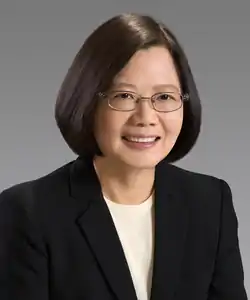 |
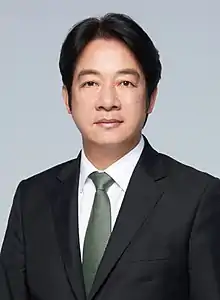 | ||||||||||||||||||||||||||
| President of the Republic of China (2016–present) |
Premier of the Republic of China (2017–2019) | ||||||||||||||||||||||||||
Candidates
| William Lai |
|---|
 |
| Premier of the Republic of China (2017–2019) |
| LN: June 13, 2019 |
Kuomintang
Former Kuomintang chairman and 2016 presidential candidate Eric Chu announced that he would run in the 2020 presidential race when he stepped down on 25 December 2018 as Mayor of New Taipei City, becoming the first big-name politician to throw his hat in the ring.[20] Former President of the Legislative Yuan Wang Jin-pyng also announced his presidential bid on 7 March.[21] Other candidates included former Deputy Secretary-General of the Presidential Office and incumbent Taipei City Councillor Lo Chih-chiang and National Taiwan University professor Chang Ya-chung who have also announced their candidacies.[22]
The party has decided to hold its primary based on a 70-30 weighing of public polls and party member votes, although it has not ruled out the possibility of drafting the strongest candidate in an all-out effort to win back power, which was seen to be reserved for the party's best performing candidate in the polls, Mayor of Kaohsiung Han Kuo-yu.[21] Several KMT heavyweights such as party chairman Wu Den-yih and even former President Ma Ying-jeou were believed to also be interested in running for the party's presidential nomination.[23] Wu Den-yih’s withdrew his proposal to only allow KMT members to decide the party’s presidential candidate which drew criticism, with some questioning whether he aimed to rig the game for himself, before he declined to run on 11 April.[24]
On 17 April, founder and chairman of Foxconn Terry Gou announced his presidential bid by joining the KMT presidential primary.[25] He also stated that he would not accept to be drafted to run. Han, Gou's potential rival, announced on 23 April that he was "willing to take responsibility" for the development of Taiwan but was "unable" to participate in the party's primary in its current form. He expressed his disapproval of the "closed-door negotiations" within the party and called for reform.[26] In order to settle the demand from Han's supporters, the party adopted a resolution to put in place special guidelines to include all its presidential hopefuls, including Han, in its primary on the next day, and also switch the primary method from 70-30 weighing of public polls and party member votes to fully being determined by public polls.[27]
On 15 July, Han Kuo-yu was announced to have won the party's poll in a press conference by KMT Vice Chairman Tseng Yung-chuan.[28] On 11 November, independent Chang San-cheng joined Kuomintang presidential ticket as the vice presidential candidate.[29] Kuomintang ticket completed registration for the election on 18 November 2019.[30][31]
Nominees
|
| |||||||||||||||||||||||||||
| Han Kuo-yu | Chang San-cheng | ||||||||||||||||||||||||||
|---|---|---|---|---|---|---|---|---|---|---|---|---|---|---|---|---|---|---|---|---|---|---|---|---|---|---|---|
| for President | for Vice President | ||||||||||||||||||||||||||
 |
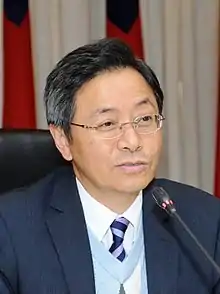 | ||||||||||||||||||||||||||
| Mayor of Kaohsiung (2018–2020) |
Premier of the Republic of China (2016) | ||||||||||||||||||||||||||
Candidates
| Terry Gou | Eric Chu | Chou Hsi-wei | Chang Ya-chung | Wang Jin-pyng | Lo Chih-chiang |
|---|---|---|---|---|---|
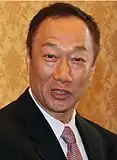 |
 |
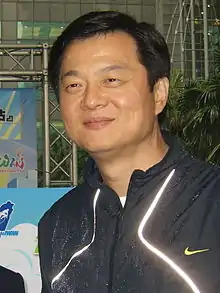 |
.jpg.webp) |
.jpg.webp) |
 |
| Chairman of Foxconn (1974–2019) |
Mayor of New Taipei (2010–2018) |
Magistrate of Taipei County (2005–2010) |
National Taiwan University Professor (2001–present) |
Member of the Legislative Yuan (1976–2020) |
Taipei City Councillor (2018–present) |
| LN: July 15, 2019 | LN: July 15, 2019 | LN: July 15, 2019 | LN: July 15, 2019 | W: June 6, 2019 | W: April 7, 2019 |
| [32] | [33] | [34] | [35] | [21][36] | [37][38] |
People First Party
On 13 November 2019, People First Party chairperson James Soong announced his fourth bid for president, along with his running mate, independent and former United Communications Group chairwoman Sandra Yu.[39]
Nominees
 | |||||||||||||||||||||||||||
| James Soong | Sandra Yu | ||||||||||||||||||||||||||
|---|---|---|---|---|---|---|---|---|---|---|---|---|---|---|---|---|---|---|---|---|---|---|---|---|---|---|---|
| for President | for Vice President | ||||||||||||||||||||||||||
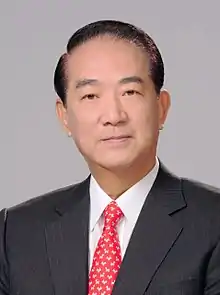 |
|||||||||||||||||||||||||||
| Governor of Taiwan (1994–1998) |
United Communications Group chairwoman (2009–2018) | ||||||||||||||||||||||||||
Withdrawn candidates
- Chang San-cheng, President of the Executive Yuan (2016)[40][41]
- Yang Shih-kuang, Television presenter and New Party Youth Corps leader[42][43]
- Annette Lu, Vice President of the Republic of China (2000–2008)[44][45]
Debates
A single television debate was held on 29 December 2019 at 2 PM local time. Most of the themes discussed had already been elaborated upon by the candidates during the policy presentations in the weeks immediately prior to the debate. As usual, Cross-Strait relations was a focal point of conversation; the candidates also touched upon military spending, nuclear energy, labour relations, and special interests. Tsai reiterated her commitment to the cross-strait status quo, without "unnecessary provocations" or changes in policy. Han said he would protect the "sovereignty of the Republic of China". James Soong said that Taiwan has inherited Chinese culture and tradition but insists that any changes to the island's political status needed to be achieved via "democratic means."[46]
Han used the debate to paint Tsai variously as being at the mercy of the "New Tide" ultra-progressive wing of her own party, a dictatorial and autocratic figure as president, a leader unable to effectively control her allegedly corrupt subordinates, and a flip-flopper on the issue of cross-strait relations. Tsai said that Han did not have concrete policies of his own and focused undue attention on attacks against her. Tsai acknowledged the DPP's poor performance in the local elections of 2018 but reiterated her position that she was the best candidate to protect against perceived encroachment of sovereignty from the PRC; she repeatedly invoked One Country, Two Systems, suggesting that Han would accede to China's position on the issue, and in her closing remarks said "do not let Taiwan be the next Hong Kong". Tsai and Han each accused the other of using internet trolls, so-called "cyber armies", to smear the other. While Tsai attacked Han for being prejudiced towards marginalized groups, Han tried to brand Tsai as an out-of-touch elitist and himself an everyman who will happily go "have street food" with the common folk as president. James Soong attempted to strike a middle ground, repeating his support for the status quo in cross-strait relations, calling for mutual understanding with the mainland, and denying his own family's connections to mainland business interests.[46]
The debate was noted for some bizarre exchanges involving Han Kuo-yu, who became especially animated on multiple occasions, raising his voice and using wild hand gestures, most notably yelling the phrase “Long live the Republic of China!” three times, in addition to employing props to complement his attacks on Tsai.[47] In response to questions from Apple Daily on the relationship between Han and a woman he allegedly had an extramarital affair with, Han called the outlet a "tabloid without the slightest standards," and responded "why don't you also ask how many girlfriends I had in college [...] and when I lost my virginity?" Han used a cross-examination segment to ask the other candidates whether they believed in god, asserted his own Buddhist faith, and said "we will all face judgment one day", without meaningful follow-up. Notably, Han also criticized former KMT president Ma Ying-jeou, saying he was "too soft".[48][46]
Opinion polling
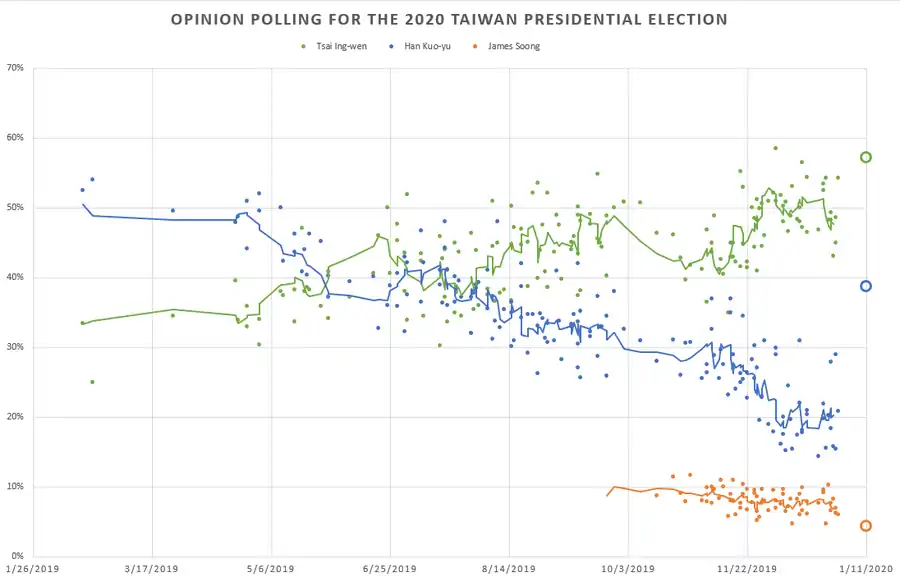
Results
| Candidate | Running mate | Party | Votes | % | |
|---|---|---|---|---|---|
| Tsai Ing-wen | William Lai | Democratic Progressive Party | 8,170,231 | 57.13 | |
| Han Kuo-yu | Simon Chang | Kuomintang | 5,522,119 | 38.61 | |
| James Soong | Sandra Yu | People First Party | 608,590 | 4.26 | |
| Total | 14,300,940 | 100.00 | |||
| Valid votes | 14,300,940 | 98.87 | |||
| Invalid/blank votes | 163,631 | 1.13 | |||
| Total votes | 14,464,571 | 100.00 | |||
| Registered voters/turnout | 19,311,105 | 74.90 | |||
| Source: CEC | |||||
Incumbent President Tsai Ing-wen won the 2020 Taiwanese presidential election with her Democratic Progressive Party and was re-elected to a second term with a historic record of 8.17 million votes (57.1 per cent),[49] the highest vote share won by a DPP candidate. Rival candidate Han Kuo-yu of the Kuomintang (KMT) was the runner up with 5.52 million votes (38.6 per cent). Despite defeat, the KMT saw a recovery in vote share from 2016, noticeably in traditionally KMT-leaning areas including Hsinchu County, Miaoli, Nantou, Hualien, and Taitung. People First Party's candidate James Soong came third and received 600,000 votes (4.26 per cent).[50] Turnout for the election was 74.9%, the highest among nationwide elections since 2008.[51]
At an election rally after the results were announced, Tsai stated, "Democratic Taiwan and our democratically elected government will not concede to threats and intimidation. The results of this election have made that answer crystal clear."[52]
| Subdivision | Tsai Ing-wen | Han Kuo-yu | James Soong
Sandra Yu |
Invalid | Total | Electorate | Turnout | ||||
|---|---|---|---|---|---|---|---|---|---|---|---|
| Votes | % | – 2nd | Votes | % | Votes | % | |||||
| Total | 8,170,231 | 57.13 | +2,648,112 | 5,522,119 | 38.61 | 608,590 | 4.26 | 163,631 | 14,464,571 | 19,311,105 | 74.90% |
| New Taipei City | 1,393,936 | 56.52 | +434,305 | 959,631 | 38.91 | 112,620 | 4.57 | 28,041 | 2,494,228 | 3,321,459 | 75.09% |
| Taipei City | 875,854 | 53.65 | +190,024 | 685,830 | 42.01 | 70,769 | 4.34 | 21,381 | 1,653,834 | 2,167,264 | 76.31% |
| Taoyuan City | 718,260 | 54.78 | +188,511 | 529,749 | 40.40 | 63,132 | 4.82 | 14,066 | 1,325,207 | 1,780,755 | 74.42% |
| Taichung City | 967,304 | 56.95 | +320,938 | 646,366 | 38.06 | 84,800 | 4.99 | 20,550 | 1,719,020 | 2,251,064 | 76.36% |
| Tainan City | 786,426 | 67.38 | +446,769 | 339,702 | 29.10 | 41,075 | 3.52 | 12,341 | 1,179,589 | 1,556,845 | 75.77% |
| Kaohsiung City | 1,097,621 | 62.23 | +486,725 | 610,896 | 34.63 | 55,309 | 3.14 | 17,006 | 1,780,832 | 2,299,558 | 77.44% |
| Yilan County | 173,657 | 63.28 | +83,647 | 90,010 | 32.80 | 10,739 | 3.91 | 3,029 | 277,435 | 375,608 | 73.86% |
| Hsinchu County | 152,380 | 46.88 | -1,844 | 154,224 | 47.45 | 18,435 | 5.67 | 3,970 | 329,009 | 438,049 | 75.11% |
| Miaoli County | 147,034 | 45.02 | -17,311 | 164,345 | 50.32 | 15,222 | 4.66 | 3,578 | 330,179 | 447,422 | 73.80% |
| Changhua County | 436,336 | 57.17 | +144,501 | 291,835 | 38.24 | 35,060 | 4.59 | 10,277 | 773,508 | 1,035,507 | 74.70% |
| Nantou County | 152,046 | 50.83 | +18,255 | 133,791 | 44.72 | 13,315 | 4.45 | 3,555 | 302,707 | 413,485 | 73.21% |
| Yunlin County | 246,116 | 61.56 | +107,775 | 138,341 | 34.60 | 15,331 | 3.83 | 5,203 | 404,991 | 565,269 | 71.65% |
| Chiayi County | 197,342 | 64.22 | +98,532 | 98,810 | 32.16 | 11,138 | 3.62 | 3,748 | 311,038 | 428,640 | 72.56% |
| Pingtung County | 317,676 | 62.16 | +138,323 | 179,353 | 35.10 | 14,021 | 2.74 | 4,992 | 516,042 | 688,793 | 74.92% |
| Taitung County | 44,092 | 38.12 | -23,321 | 67,413 | 58.28 | 4,163 | 3.60 | 1,119 | 116,787 | 179,536 | 65.05% |
| Hualien County | 66,509 | 35.91 | -45,325 | 111,834 | 60.38 | 6,869 | 3.71 | 2,081 | 187,293 | 269,558 | 69.48% |
| Penghu County | 27,410 | 53.85 | +6,499 | 20,911 | 41.08 | 2,583 | 5.07 | 644 | 51,548 | 88,432 | 58.29% |
| Keelung City | 114,966 | 50.82 | +15,606 | 99,360 | 43.92 | 11,878 | 5.25 | 2,458 | 228,662 | 311,801 | 73.34% |
| Hsinchu City | 144,274 | 55.26 | +41,549 | 102,725 | 39.34 | 14,103 | 5.40 | 3,423 | 264,525 | 345,345 | 76.60% |
| Chiayi City | 99,265 | 61.37 | +42,996 | 56,269 | 34.79 | 6,204 | 3.84 | 1,664 | 163,402 | 215,055 | 75.98% |
| Kinmen County | 10,456 | 21.77 | -25,492 | 35,948 | 74.83 | 1,636 | 3.41 | 423 | 48,463 | 120,721 | 40.14% |
| Lienchiang County | 1,226 | 19.81 | -3,550 | 4,776 | 77.16 | 188 | 3.04 | 82 | 6,272 | 10,939 | 57.34% |
Maps
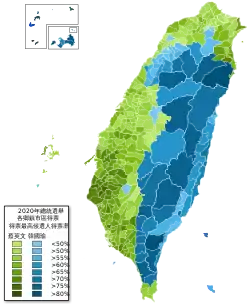 Vote leader and vote share in township-level districts. |
 Vote leader in county-level districts. |
 Swing between the two major parties from the previous presidential election. |
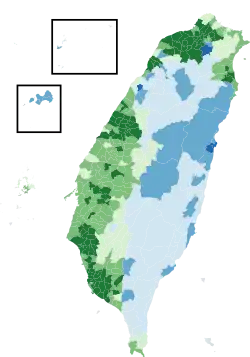 Winner vote lead over runner-up by township/city or district. |
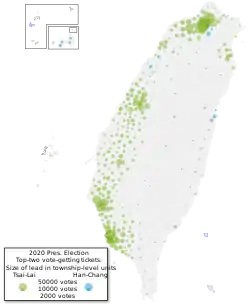 Size of lead between the two tickets. |
References
- "Taiwan opposition candidate admits defeat in presidential election". Reuters. 11 January 2020. Archived from the original on 22 January 2020. Retrieved 11 January 2020.
- Kuo, Lily (11 January 2020). "Taiwan re-elects Tsai Ing-Wen as president in clear message to China". The Guardian. ISSN 0261-3077. Archived from the original on 11 January 2020. Retrieved 11 January 2020.
- 黃欣柏、吳書緯 (11 January 2020). "連任成功!蔡英文817萬票史上最高 樹立「小英障礙」". Liberty Times. Retrieved 12 January 2020.
- "Presidential and Vice Presidential Election and Recall Act". Archived from the original on 13 January 2019. Retrieved 15 January 2019.
- "随行出访国安人员走私香烟 蔡英文震怒三官员受惩处". 联合早报. 23 July 2019. Archived from the original on 15 September 2019. Retrieved 26 July 2019.
- "反送中蔓延 助攻蔡大選". 聯合新聞網. 13 August 2019. Archived from the original on 1 September 2019. Retrieved 13 August 2019.
- "罵完警政署又被韓粉攻 黃光芹氣炸:我跟韓國瑜勢不兩立". 自由時報. 22 May 2019. Archived from the original on 23 May 2019. Retrieved 9 January 2020.
- 黃婉婷 (4 September 2019). "鳳凰與雞的「雞」是誰?韓國瑜曝海關陳情:最近很多來台賣淫、非法打工的人". 風傳媒. Archived from the original on 30 December 2019. Retrieved 9 January 2020.
- 記者:詹士弘 (15 June 2019). "台灣實施一國兩制? 韓國瑜:除非OVER MY DEAD BODY" (in Chinese). 自由时报电子报. Archived from the original on 28 September 2019. Retrieved 28 September 2019.
- "Chinese spy confirms China's involvement in Taiwan 2020 election". Taiwan News. 23 November 2019. Archived from the original on 27 November 2019. Retrieved 25 November 2019.
- "Taiwan's ruling party faces serious challenges in 2020". Asia Times. 11 December 2018. Archived from the original on 15 January 2019. Retrieved 15 January 2019.
- Lee, Yimou (23 November 2018). "Taiwan president quits as party chair after local election setback". Reuters. Archived from the original on 12 July 2019. Retrieved 12 January 2020.
- Lee Yimou (10 January 2019). "Taiwan premier, cabinet to quit after local election defeat". Reuters. Archived from the original on 10 September 2019. Retrieved 12 January 2020.
- "Taiwan President Tsai Ing-wen says she will run for re-election in 2020". The Straits Times. 19 February 2019. Archived from the original on 19 February 2019. Retrieved 19 February 2019.
- Yang, Chun-hui; Hsiao, Sherry (19 March 2019). "Lai seeks DPP's backing for 2020 race". Taipei Times. Archived from the original on 19 March 2019. Retrieved 19 March 2019.
- "Tsai Ing-wen, Taiwan's president, is challenged by a former underling". The Economist. 21 March 2019. Archived from the original on 22 March 2019. Retrieved 22 March 2019.
- Yeh, Su-ping; Elizabeth, Hsu (18 June 2019). "DPP to officially nominate Tsai as candidate in 2020 election". Central News Agency. Archived from the original on 18 June 2019. Retrieved 19 June 2019.
- Ku, Chuan; Yeh, Su-ping; Lim, Emerson (19 June 2019). "DPP formally backs Tsai Ing-wen as 2020 presidential nominee". Central News Agency. Archived from the original on 19 June 2019. Retrieved 19 June 2019.
- Ku, Chuan; Yeh, Su-ping; Hsu, Elizabeth (17 November 2019). "Tsai-Lai presidential ticket formally formed". Central News Agency. Archived from the original on 17 November 2019. Retrieved 17 November 2019.
- "KMT veteran Eric Chu announces bid for Taiwan presidency in 2020". The Straits Times. 25 December 2018. Archived from the original on 15 January 2019. Retrieved 15 January 2019.
- Liu, Kuan-ting; Wang, Flor (6 June 2019). "Wang Jin-pyng drops bid for Taiwan President, bows out of KMT primary". Taiwan News. Archived from the original on 6 June 2019. Retrieved 6 June 2019.
- Yun, Chen (22 March 2019). "KMT candidates blast primary 'indecision'". Archived from the original on 3 September 2019. Retrieved 12 January 2020.
- "Eric Chu announces bid for 2020 presidential election". Central News Agency. 25 December 2018. Archived from the original on 15 January 2019. Retrieved 15 January 2019.
- "Wu Den-yih rules out presidential run". Taipei Times. 11 April 2019. Archived from the original on 18 April 2019. Retrieved 18 April 2019.
- Everington, Keoni (17 April 2019). "Breaking News: Foxconn tycoon Terry Gou announces bid for Taiwan presidency". Taiwan News. Archived from the original on 18 April 2019. Retrieved 18 April 2019.
- "Kaohsiung Mayor Han Kuo-yu passes on KMT primary, hints at presidential bid". Taiwan News. 23 April 2019. Archived from the original on 24 April 2019. Retrieved 24 April 2019.
- "KMT decides to include Han Kuo-yu in presidential primary". Central News Agency. 24 April 2019. Archived from the original on 24 April 2019. Retrieved 25 April 2019.
- News, Taiwan. "Breaking News: Han wins KMT primary poll for ..." Taiwan News. Archived from the original on 15 July 2019. Retrieved 15 July 2019.
- Lin, Shu-yuan; Huang, Frances (11 November 2019). "Han announces former premier Chang as running mate". Central News Agency. Archived from the original on 11 November 2019. Retrieved 18 November 2019.
- Lim, Emerson; Yeh, Joseph (18 November 2019). "KMT presidential candidates register for January 2020 election". Central News Agency. Archived from the original on 19 November 2019. Retrieved 18 November 2019.
- Maxon, Ann (19 November 2019). "2020 ELECTIONS: Han registers for presidential election". Taipei Times. Archived from the original on 19 November 2019. Retrieved 19 November 2019.
- Shih, Hsiao-kuang; Hetherington, William (18 April 2019). "Hon Hai's Gou officially enters presidential race". Taipei Times. Archived from the original on 18 April 2019. Retrieved 18 April 2019.
- "Archived copy" 朱立倫卸新北市長 宣布投入2020總統選舉 (in Chinese). Central News Agency. 25 December 2018. Archived from the original on 11 January 2019. Retrieved 15 January 2019.CS1 maint: archived copy as title (link)
- Hsu, Stacy (2 March 2019). "KMT brass might select candidate: Wu". Taipei Times. Archived from the original on 2 March 2019. Retrieved 2 March 2019.
- Maxon, Ann (8 January 2019). "Ex-Hung Hsiu-chu aide eyes presidential run". Taipei Times. Archived from the original on 7 January 2019. Retrieved 8 January 2019.
- "Former legislative speaker announces presidential bid". Central News Agency. 7 March 2019. Archived from the original on 7 March 2019. Retrieved 7 March 2019.
- "Archived copy" 拋震撼彈!羅智強宣布4階段參選總統! (in Chinese). China Times. 26 November 2018. Archived from the original on 26 November 2018. Retrieved 15 January 2019.CS1 maint: archived copy as title (link)
- "Archived copy" 羅智強宣布不選總統了!要吳敦義「快徵召韓國瑜」. tw.news.yahoo.com (in Chinese). Archived from the original on 17 April 2019. Retrieved 22 April 2019.CS1 maint: archived copy as title (link)
- Wang, Cheng-chung; Huang, Frances (13 November 2019). "James Soong announces presidential bid (update)". Central News Agency. Archived from the original on 13 November 2019. Retrieved 13 November 2019.
- Lee, Hsin-fang (17 February 2019). "Former premier Simon Chang seeks 2020 presidential run as independent". Taipei Times. Archived from the original on 16 February 2019. Retrieved 17 February 2019.
- "Archived copy" 2019-08-02【POP撞新聞】黃暐瀚專訪張善政:「挺韓、不選2020」!. POP Radio (in Chinese). 2 August 2019. Archived from the original on 2 August 2019. Retrieved 2 August 2019.CS1 maint: archived copy as title (link)
- Chen, Yu-fu (3 July 2019). "New Party candidate vows to target 'woman' Tsai". Taipei Times. Archived from the original on 3 July 2019. Retrieved 3 July 2019.
- "Archived copy" 總統連署未達門檻 新黨楊世光宣布改挺韓國瑜. FTV News (in Chinese). 1 November 2019. Archived from the original on 10 November 2019. Retrieved 1 November 2019.CS1 maint: archived copy as title (link)
- Wu, Chun-feng; Yang, Chun-hui; Chung, Jake (18 September 2019). "Ex-vice president Lu to run for president". Taipei Times. Archived from the original on 18 September 2019. Retrieved 18 September 2019.
- Huang, Rei-hung; Ko, Lin (2 November 2019). "Former Taiwan vice president abandons presidential bid". Central News Agency. Archived from the original on 2 November 2019. Retrieved 2 November 2019.
- "A Recap of Taiwan 2020 Presidential Debate". The News Lens. 30 December 2019. Archived from the original on 30 December 2019. Retrieved 9 January 2020.
- https://www.taiwannews.com.tw/en/news/3943810
- "Presidential debate sees attacks on media, personal vitriol". Focus Taiwan (CNA). 29 December 2019.
- Kao, Shanshan (11 January 2020). "Tsai Ing-wen wins her second term as Taiwan's president with most ever votes". South China Morning Post. Retrieved 12 January 2020.
- "Tsai Ing-wen wins landslide in Taiwan presidential election". aljazeera.com. Retrieved 12 January 2020.
- Strong, Matthew (11 January 2020). "Taiwan President Tsai Ing-wen wins election with record 8.17 million votes". Taiwan News. Retrieved 12 January 2020.
- Feng, Emily (11 January 2020). "Rebuking China, Taiwan Votes To Reelect President Tsai Ing-wen". NPR. Retrieved 12 January 2020.
- "中選會選舉資料庫網站". cec.gov.tw (in Chinese). Archived from the original on 29 January 2020. Retrieved 16 January 2020.
